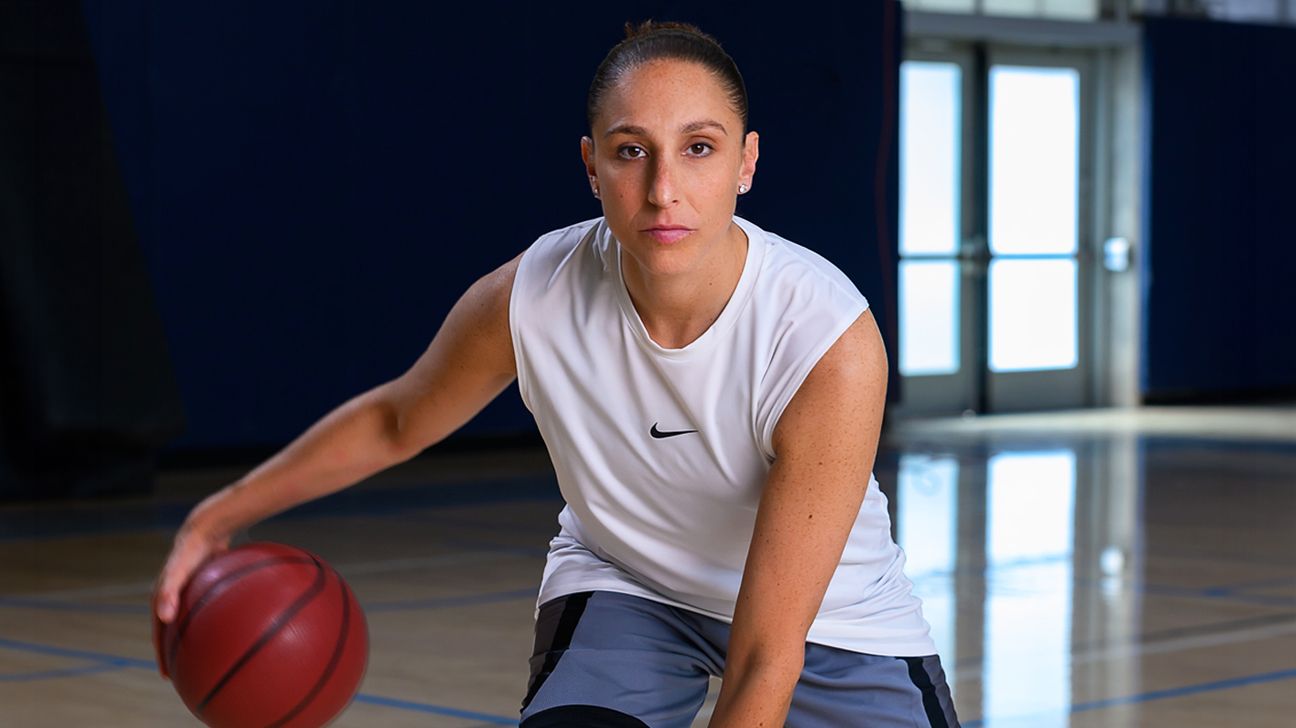 WNBA legend Diana Taurasi (above) is sharing how she learned to manage painful eczema flair-ups. Photography courtesy of Sanofi Regeneron
WNBA legend Diana Taurasi (above) is sharing how she learned to manage painful eczema flair-ups. Photography courtesy of Sanofi Regeneron- WNBA legend Diana Taurasi is opening up about her journey with eczema for the first time.
- The basketball star has been living with the skin condition for decades.
- Taurasi is speaking out to spread awareness and ignite confidence in others to take control of their condition.
WNBA icon Diana Taurasi is known for being one of the greatest players in women’s basketball. The 42-year-old star is the league’s all-time scoring leader by more than 2,500 points. Plus, with five Olympic gold medals to her name, she is currently tied with Sue Bird for the most Olympic titles in U.S. basketball history — for men or women. This summer, she is vying for a sixth title at the 2024 Paris Olympics.
For years, Taurasi has wowed fans by knocking down three-pointers, mid-range shots, and contested layups.
However, what many fans don’t know is that she does it all while living with eczema, a chronic skin condition that affects more than 31 million Americans.
During her college days at the University of Connecticut, Taurasi began having outbreaks of red, itchy, scaly skin, which made her feel uncomfortable on and off the court.
“Obviously, while playing basketball, it’s not something that I can hide. You know, always being in a jersey and being on the court, so it’s something that was always in the back of my mind, and I was always looking for relief,” Taurasi told Healthline.
Eczema can interfere with physical activities, including sports, especially when it involves areas of the skin that are important for certain activities, such as the hands, arms, or legs, said Dr. Shoko Mori, a dermatologist at Northwell Lenox Hill Hospital.
“It can be difficult for patients to perform certain activities at their full potential if they are having an active eczema flare,” she told Healthline.
The condition can interfere with everyday activities, too, said Taurasi.
“[Instead] of being enjoyable, they’re a drag,” she said. “I remember going to the pool and going to the beach, and everyone would just be hanging out, and the minute I got in the water, I’m like, ‘Oh no. I could feel it,’ and I would always have to respond with lotion here, cream there. I’d always have to make sure I had everything set and could actually enjoy the moment.”
How Taurasi found relief after years of living with eczema
For years, Taurasi hoped her eczema would go away on its own. However, as time went on, she learned that it was hard to predict when flare-ups would occur.
“There’s a lot of different factors to battling eczema and outbreaks can come at any minute by any sort of factor,” she said. “The conditions are always something that can trigger your outbreak whether it’s weather, whether it’s stress, whether it’s different water types and heat and cold, sweating in the gym all the time. All those things are a factor.”
The National Eczema Association states that the following may trigger or aggravate an eczema flare.
- Dry skin that becomes brittle, scaly, rough, or tight
- Irritants, such as soaps, shampoos, detergents, and perfumes, as well as natural substances like the juice from fruit, vegetables, or meats.
- Stress, which can bring on an eczema flare or make it worse
To help with flares, Mori said quality moisturizers are an important part of eczema treatment.
“Creams and ointments tend to do a better job of moisturizing compared to lotions, which are thinner and have a higher water content,” she said. “Moisturizers containing colloidal oatmeal can be soothing for patients with eczema. They should also be fragrance-free, as fragrances can be irritating for eczema-prone skin.”
A dermatologist can help determine the best treatment options for eczema based on the person’s specific type and severity. These options might include topical, oral, and injection medications.
“Topical medications include both steroid and nonsteroidal creams and ointments. More recently, there are injection and oral medications that have been developed to target the specific mechanisms in our bodies that cause eczema,” said Mori.
After trying different kinds of topical medicine that provided relief for a couple of hours, Taurasi turned to her dermatologist for other options to treat her moderate-to-severe eczema.
She found relief with the biologic injectable medication Dupixent.
“Dupixent works by targeting an underlying source of inflammation that can be a root cause of eczema,” Dr. Anabelle Garcia, a dermatologist at Sonterra Dermatology, told Healthline.
The medicine is now part of Taurasi’s weekly ritual and lifestyle.
“[Using] Dupixent and having clear skin now has given me relief in so many ways,” she said. “I’ve been dealing with moderate-to-severe eczema pretty much my whole life; it’s been groundbreaking for me and my story.”
Demanding attention on and off the court
Taurasi is carrying over her on-court confidence into her personal life by sharing her experience with eczema. She teamed up with Sanofi Regeneron to spread awareness about the condition.
“There’s nothing like hearing stories that you can relate to. It’s like, ‘Oh, yeah, I went through that,’” she said. “Everyone’s personal journey is different when it comes to eczema, but it’s been a great collaboration.”
In addition to treatment options, Taurasi is open about how living with a chronic condition like eczema can also affect mental health.
“There were many times when I would walk on the court and look down and feel [like] I’m not myself, and it’s something that now having clear skin has really given me a different outlook on eczema and how to battle all those outbreaks,” she said.
For many people living with uncontrolled moderate-to-severe eczema, much of their lives are spent coping with symptoms, which can be an emotional experience, said Garcia.
“Eczema often presents as rashes that can be seen, and people living with the disease can be scared to talk about their skin or resort to hiding their skin from others,” she said.
During past flare-ups, people often asked Taurasi if her condition was contagious. She always answered “no” and explained that it was eczema. However, the question led to some discomfort.
“I didn’t know what they thought about it so that’s almost even worse when you don’t know,” Taurasi said.
Using her platform to set the record straight is rewarding, especially as women’s basketball and the WNBA are experiencing a long overdue moment in time.
“I think we’re in an amazing cross-section of women’s sports kicking off in the last 4 or 5 years. Obviously, social media, NIL–there’s a lot of factors that are contributing to where women’s sports, especially the WNBA, is right now,” said Taurasi.
The stability of professional women’s basketball is one of the best things to come out of the growing popularity of the game, she added.
“[I] think that’s what we want with this momentum…and at the same time [to] reflect that light on so many people, so many coaches and trainers and GMs and players that continually came back and played in the WNBA when conditions weren’t at its best…because they love the game of basketball and they wanted to see this league succeed, and it’s really a testament to everyone who came before us,” Taurasi said.
She carries the same gratitude and passion with her efforts related to eczema.
“It’s nice when you can align with a partnership that you have a lot in common with, and that goes obviously with how I treat basketball and how I treat my life, and [partnering] with Dupixent is something that I can relate to personally every single day. I think about it. I live it,” she said.

 1 week ago
6
1 week ago
6








 English (US)
English (US)